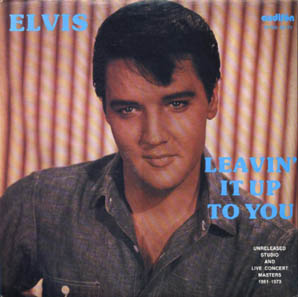

“ Leavin’ It Up To You ” Audiofon AFNS 66173 was released in 1980. Again, the German text is to disguise the fact that the LP was produced in the Unites States. This is most likely the second release in the series of three separate single LPs, and this is the last Audiofon LP release I have to review. The LP cover features a mid 60’s photo of Elvis sans sideburns, as does the back LP cover with the patented track listing on the flanks. Neither photo is representative of the Rocking’ King Elvis that has become the international icon. The track listing, either due to laziness or lack of space, doesn’t even attempt to list the take numbers of the studio outtakes…not that we are missing much here. The track of most interest is indeed the title track: “ Leavin’ It Up To You ”. The LP labels are the standard Audiofon darkish blue with silver text. The LP was mastered in stereo, however most of the tracks are mono. The LP pressing has some surface noise but is very listen-able and the fidelity of the recordings is excellent. The only problem can be found with the play-back speed of some of the tracks.
Side One:
As the story from the producer goes; this track was recorded during a
1972 ( most likely August ) Las Vegas rehearsal by someone with a tape recorder
in their pocket. It certainly sounds like
a rehearsal and the ambience is indicative of a rehearsal space.
The producers of the LP pulled a little trick as they spliced the track
in order to repeat what is a very short four-line version in an attempt to make
it longer…can’t blame them for trying I guess.
The clarity of the recording suggests the concealed tape-recorded
probably wasn’t in the perpetrators pocket as the recording does not sound
muffled as would be the case of sound waves through clothing fabric.
In either case, someone preserved a snippet of an otherwise unrecorded
song as performed by Elvis. Though it
starts with some funny dialogue between Elvis and the control room, it’s
all-downhill from here. “ Stop
Where You Are ” is take 1 (Aug 2, 1965) from “ Paradise Hawaiian Style
”…and it sounds as though the song plays too fast…which is fine cause it
gets it over with faster. “ Fever ”
is taken from the oft-scavenged Aloha Rehearsal show.
If Audiofon had just stuck to releasing this show by itself, they could
have released two studio-outtake LPs that would have been more comprehensive in
regards to a theme. But that would have
meant less profit and we certainly could not have lived without this material
spread out over three LPs!! “
Aloha-Oe ” take 6 (March 21, 1961) from the Blue Hawaii Sessions begins with
some interesting banter in regards to Elvis singing the end of the song…but
again the track plays back to fast and that noticeable voice pitch is annoying.
This is the only track on this side that is in stereo, though I think it
is reversed as the backing vocals are on the left side.
“ Sand Castles ” takes 5 and 10 ( Aug 2, 1965 ), also from “
Paradise Hawaiian Style ”, is your basic movie soundtrack fare…though I’d
like to know what a dancing-whale looks like. The
side wraps up with “ Burning Love ” from the Aloha rehearsal.
Side Two:
We begin with a stereo acetate of an un-dubbed “ Patch it Up ” ( June
8, 1970 ) which was always one of my least favorite songs from these sessions,
but is the only stereo track on this side. “
King of the Whole Wide World ” take 25 ( October 26, 1961 ) from the “ Kid
Galahad ” sessions is a very long rendition of this pop tune complete with
saxophone solo that runs out the end of the song. “ You Gave Me A Mountain ” ( printed incorrectly prefixed with
“ Lord ” ) again takes us to the Aloha rehearsal.
I suppose in 1980 the fact of simply having these tracks would have been
exciting even though the concert is portioned out over three LPs.
“ I Slipped, I Stumbled, I Fell ” is an un-numbered take ( Nov 8,
1960…incorrectly dated as Oct 1960 ) from “ Flaming Star ” is mastered too
fast, and the pitch could almost pass it off for Alvis and his Chipmunks.
“ Queenie Wahine’s Papaya ” vocal overdub takes 1 and 2 ( Aug 4,
1965 ) “ Paradise, Hawaiian Style ” ( proving this version of “ Hawaiian
style ” certainly was no “ paradise ” for Elvis ) is one of the more
famous tracks because it is so bad. With
its silly tongue-twisting lyrics, and the fact that the tempo increases as the
song progresses making the lyrics even more difficult to pronounce, the vocal
takes of this song are a novelty in their own right.
“ Mary in the Morning ” ( June 5, 1970 ) is from an un-dubbed acetate.
This is a great song and this un-dubbed form is someone how more intimate
without the overblown orchestration and backing vocals that adorn the final
master. Elvis’ voice is beautiful
and his reading of the lyrics is touching.
Ernie Boyes Jr.